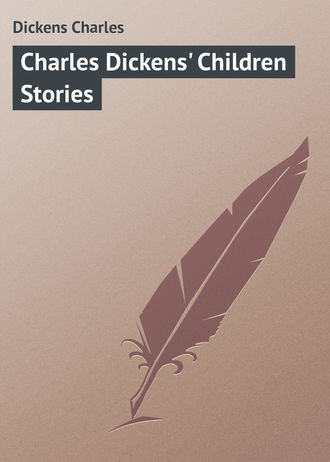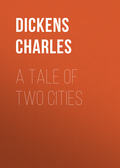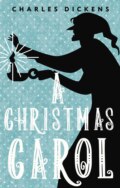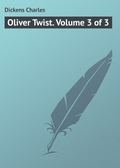
Чарльз Диккенс
Charles Dickens' Children Stories
TROTTY VECK AND HIS DAUGHTER MEG
"TROTTY" seems a strange name for an old man, but it was given to Toby Veck because of his always going at a trot to do his errands; for he was a porter, and carried letters and messages for people who were in too great a hurry to send them by the post. He did not earn very much, and had to be out in all weathers and all day long. But Toby was of a cheerful disposition, and looked on the bright side of everything. His greatest joy was his dear daughter Meg, who loved him dearly.
One cold day Toby had been trotting up and down in his usual place before the church, when the bells chimed twelve o'clock, which made Toby think of dinner.
"There's nothing," he remarked, "more regular in coming round than dinner-time, and nothing less regular in coming round than dinner. That's the great difference between 'em." He went on talking to himself never noticing who was coming near to him.
"Why, father, father," said a pleasant voice, and Toby turned to find his daughter's sweet, bright eyes close to his.
"Why, pet," said he, kissing her, "what's-to-do? I didn't expect you to-day, Meg."
"Neither did I expect to come, father," said Meg, smiling. "But here I am! And not alone, not alone!"
"Why, you don't mean to say," observed Trotty, looking curiously at the covered basket she carried, "that you? – "
"Smell it, father dear," said Meg; "only smell it, and guess what it is."
Toby took the shortest possible sniff at the edge of the basket. "Why, it's hot," he said.
But to Meg's great delight he could not guess what it was that smelt so good. At last he exclaimed in triumph, "Why, what am I a-thinking of? It's tripe!"
And it was.
Just as Toby was about to sit down to his dinner on the doorsteps of a big house close by, the chimes rang out again, and Toby took off his hat and said, "Amen."
"Amen to the bells, father?"
"They broke in like a grace, my dear," said Trotty, "they'd say a good one if they could, I'm sure. Many's the kind thing they say to me. How often have I heard them bells say, 'Toby Veck, Toby Veck, keep a good heart, Toby!' A millions times? More!"
"Well, I never!" cried Meg.
While Toby ate his unexpected dinner with immense relish, Meg told him how her lover Richard, a young blacksmith, had brought his dinner to share with her, and had begged her to marry him on New Year's Day, "the best and happiest day of the whole year."
"So," went on Meg, "I wanted to make this a sort of holiday to you, as well as a dear and happy day to me, father, and I made a little treat and brought it to surprise you."
Just then, Richard himself came up to persuade Toby to agree to their plan; and almost at the same moment, a footman came out of the house and ordered them all off the steps, and some gentleman came out who called up Trotty, and gave him a letter to carry.
Toby trotted off to a very grand house, where he was told to take the letter in to the gentleman. While he was waiting, he heard the letter read. It was from Alderman Cute, to tell Sir Joseph Bowley that one of his tenants named Will Fern who had come to London to try and get work, had been brought before him charged with sleeping in a shed, and asking if Sir Joseph wished him to be dealt leniently with or otherwise. To Toby's great disappointment the answer was given that Will Fern might be sent to prison as a vagabond, though his only fault was poverty. On his way home, Toby ran against a man dressed like a countryman, carrying a fair-haired little girl. The man asked him the way to Alderman Cute's house.
"It's impossible," cried Toby, "that your name is Will Fern?"
"That's my name," said the man.
Thereupon Toby told him what he had just heard, and said "Don't go there."
Poor Will told him how he could not make a living in the country, and had come to London with his orphan niece to try and find a friend of her mother's and to endeavor to get some work, and wishing Toby a happy New Year, was about to trudge wearily off again, when Trotty caught his hand saying —
"Stay! The New Year never can be happy to me if I see the child and you go wandering away without a shelter for your heads. Come home with me. I'm a poor man, living in a poor place, but I can give you lodging for one night and never miss it," and lifting up the pretty little one, he trotted towards home, and rushing in, he set the child down before his daughter. The little girl ran into her arms at once, while Trotty ran round the room, saying, "Here we are and here we go. Here, Uncle Will, come to the fire. Meg, my precious darling, where's the kettle? Here it is and here it goes, and it'll bile in no time!"
"Why, father!" said Meg, "you're crazy to-night, I think. Poor little feet, how cold they are!"
"Oh, they're warmer now!" exclaimed the child. "They're quite warm now!"
"No, no, no," said Meg. "We haven't rubbed 'em half enough. And when they're done, we'll brush out the damp hair; and we'll bring some color to the poor pale face with fresh water; and then we'll be so gay and brisk and happy!"
The child sobbing, clasped her round the neck, saying, "O Meg, O dear Meg!"
"Good gracious me!" said Meg, presently, "father's crazy! He's put the dear child's bonnet on the kettle, and hung the lid behind the door!"
Trotty hastily repaired this mistake, and went off to find some tea and a rasher of bacon he fancied "he had seen lying somewhere on the stairs." He soon came back and made the tea, and before long they were all enjoying the meal.
After tea Meg took Lilian to bed, and Toby showed Will Fern where he was to sleep. Then he went to sit by the fire and read his paper, and fell asleep, to have a wonderful dream so terrible and sad, that it was a great relief when he woke to find Meg sitting near him, putting some ribbons on her simple gown for her wedding, and looking so happy and young and blooming, that he jumped up to clasp her in his arms.
But somebody came rushing in between them, crying, – "No! Not even you. The first kiss of Meg in the New Year is mine. Meg, my precious prize, a happy year! A life of happy years, my darling wife!"
Then in came Lilian and Will Fern, and a band of music with a flock of neighbors burst into the room, shouting, "A Happy New Year, Meg." "A happy wedding!" "Many of 'em," and the Drum stepped forward and said —
"Trotty Veck, it's got about that your daughter is to be married to-morrow. And there ain't a soul that knows you both that don't wish you both all the happiness the New Year can bring. And here we are, to play it in and dance it in accordingly." Then Mrs. Chickenstalker came in (a good-humored, comely woman, who, to the delight of all, turned out to be the friend of Lilian's mother for whom Will Fern had come to look), to wish Meg joy, and then the music struck up, and Trotty, making Meg and Richard second couple, led off Mrs. Chickenstalker down the dance, and danced it in a step unknown before or since, founded on his own peculiar trot.
TINY TIM
THERE was once a man who did not like Christmas. His name was Scrooge, and he was a hard sour-tempered man of business, intent only on saving and making money, and caring nothing for anyone. He paid the poor, hard-working clerk in his office as little as he could possibly get the work done for, and lived on as little as possible himself, alone, in two dismal rooms. He was never merry or comfortable, or happy, and he hated other people to be so, and that was the reason why he hated Christmas, because people will be happy at Christmas, you know, if they possibly can.
Well, it was Christmas eve, a very cold and foggy one, and Mr. Scrooge, having given his poor clerk unwilling permission to spend Christmas day at home, locked up his office and went home himself in a very bad temper. After having taken some gruel as he sat over a miserable fire in his dismal room, he got into bed, and had some wonderful and disagreeable dreams, to which we will leave him, whilst we see how Tiny Tim, the son of his poor clerk, spent Christmas day.
The name of this clerk was Bob Cratchet. He had a wife and five other children beside Tim, who was a weak and delicate little cripple, gentle and patient and loving, with a sweet face of his own, which no one could help looking at.
It was Mr. Cratchet's delight to carry his little boy out on his shoulder to see the shops and the people; and to-day he had taken him to church for the first time.
"Whatever has got your precious father, and your brother Tiny Tim!" exclaimed Mrs. Cratchet, "here's dinner all ready to be dished up. I've never known him so late on Christmas day before."
"Here he is, mother!" cried Belinda, and "here he is!" cried the other children, as Mr. Cratchet came in, his long comforter hanging three feet from under his threadbare coat; for cold as it was the poor clerk had no top-coat. Tiny Tim was perched on his father's shoulder.
"And how did Tim behave?" asked Mrs. Cratchet.
"As good as gold and better," replied his father. "He told me, coming home, that he hoped the people in church, who saw he was a cripple, would be pleased to remember on Christmas day who it was who made the lame to walk."
"Bless his sweet heart!" said the mother in a trembling voice.
Dinner was waiting to be dished up. Mrs. Cratchet proudly placed a goose upon the table. Belinda brought in the apple sauce, and Peter the mashed potatoes; the other children set chairs, Tim's as usual close to his father's; and Tim was so excited that he rapped the table with his knife, and carried "Hurrah." After the goose came the pudding, all ablaze, with its sprig of holly in the middle, and was eaten to the last morsel; then apples and oranges were set upon the table, and a shovelful of chestnuts on the fire, and Mr. Cratchet served round some hot sweet stuff out of a jug as they closed round the fire, and said, "A Merry Christmas to us all, my dears, God bless us." "God bless us, every one," echoed Tiny Tim, and then they drank each other's health, and Mr. Scrooge's health, and told stories and sang songs.
Now in one of Mr. Scrooge's dreams on Christmas eve a Christmas spirit showed him his clerk's home; he saw them all, heard them drink his health, and he took special note of Tiny Tim himself.
How Mr. Scrooge spent Christmas day we do not know; but on Christmas night he had more dreams, and the spirit took him again to his clerk's poor home.
Upstairs, the father, with his face hidden in his hands, sat beside a little bed, on which lay a tiny figure, white and still. "Tiny Tim died because his father was too poor to give him what was necessary to make him well; you kept him poor," said the dream-spirit to Mr. Scrooge. The father kissed the cold, little face on the bed, and went down-stairs, where the sprays of holly still remained about the humble room; and taking his hat, went out, with a wistful glance at the little crutch in the corner as he shut the door. Mr. Scrooge saw all this, but, wonderful to relate, he woke the next morning feeling as he had never felt in his life before.
"Why, I am as light as a feather, and as happy as an angel, and as merry as a schoolboy," he said to himself. "I hope everybody had a merry Christmas, and here's a happy New Year to all the world."
Poor Bob Cratchet crept into the office a few minutes late, expecting to be scolded for it, but his master was there with his back to a good fire, and actually smiling, and he shook hands with his clerk, telling him heartily he was going to raise his salary, and asking quite affectionately after Tiny Tim! "And mind you make up a good fire in your room before you set to work, Bob," he said, as he closed his own door.
Bob could hardly believe his eyes and ears, but it was all true. Such doings as they had on New Year's day had never been seen before in the Cratchet's home, nor such a turkey as Mr. Scrooge sent them for dinner. Tiny Tim had his share too, for Tiny Tim did not die, not a bit of it. Mr. Scrooge was a second father to him from that day, he wanted for nothing, and grew up strong and hearty. Mr. Scrooge loved him, and well he might, for was it not Tiny Tim who had unconsciously, through the Christmas dream-spirit, touched his hard heart, and caused him to become a good and happy man?







